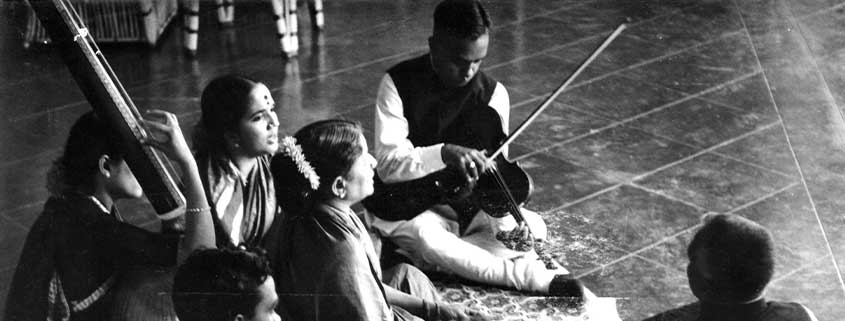Akhila Ramnarayan
(First Published in Jan 2005 in Sruti Notes, Newsletter of Sruti – India Music and Dance Society, Delaware Valley, USA)
How I dreaded those 3 o’ clock Sunday “tiffins” at Vijaya mami’s house when I was a little girl! Nose in a book, I would be shooed into my mother’s room and maneuvered into a pavadai chattai, hair oiled and woven into a single, thick braid by my grandmother. Then we would leave, all three generations bedecked in jasmine and silks, for the Nungambakkam home where Vijaya mami lived.
A sprawling kolam embellished with peacock plume and lotus flower, the original handiwork of Babuji (Rukmini Krishnamurti, the late Kalki Krishnamurti’s wife, was given this nickname by a grandchild), adorned the front yard of the house. Up the steps and through the iron grill, you could see all the way to the backyard while you waited for Vijaya Mami (daughter of M.S.Suubulakshmi and Sadasivam) to unlock the sliding door. The house was cool and dark, with red sandstone floors, and the tiny living room in which we all gathered smelled of incense, freshly picked flowers, and Vijaya Mami’s divine cooking.
On top of the old-fashioned gramophone radio, the room’s centerpiece, adorned with hibiscus and yellow sampangi, sat a large black-and-white photograph of Kalki thatha. Babuji’s daily ritual included dusting the mantel and decorating her husband’s photograph with festive blooms, which you then dutifully admired.
Some weeks, Ammu Patti was already waiting for us with Radha akka in the family room, exclaiming with delight as each group of visitors entered. While Vijaya Mami bustled (I don’t ever remember her sitting down!) and Babuji pottered, we sat cross-legged on the floor, ready to partake in tiffin and communal song.
Kadayanallur (Venkatraman) Mama, a longtime friend and composer of many of Patti’s most famous tunes, was a much-awaited presence. Entering silently and leaving equally unobtrusively, he would reluctantly elaborate a raga (sometimes Valaji, sometimes Kambodi) at Patti’s repeated requests. “Enna karpanai, aha! Ellarum kelungo!” (What an imagination! All of you listen), Patti would exclaim.
Sometimes, we would practise an oonjal song composed specially for a family wedding. Other times, Patti would render a new kriti that Kadayanallur Mama had recently set to tune. More relaxed than at a concert, she would surprise you with an Akhilandeswari (Dvijavanti), always insisting that the entire congregation join in the singing, and smile at the child of the same name in front of her. (For years, I thought this song was about me!) More often than not, Patti would break off mid-phrase to ask, “Vijaya, inniki kartala enna samaiyal?” (Vijaya, what did you cook today?) or “Anandhi, Ambi sowkyama?” (Anandhi, is Ambi well?). Reminiscences past and stories present, of homes and husbands, children and chores, would then be exchanged over the drone of the sruti box. Whenever this would happen, Kadayanallur Mama frowned at my mother, “Unga Pattiya pada solungo. Pechu porum!” (Tell your grandmother to stop talking and start singing!) Patti would cup her face in her long, slender hands, the diamonds in her nose winking, giggling like a little girl when admonished this way.
Throughout these teatime sessions, piping hot coffee would make the rounds, followed by pink-tipped strands of jasmine coiled onto banana leaves. Babuji would distribute kalkandu (little sugar crystals) or bananas or kadalai/ellu urundai (candied peanut or sesame brittle). The piece de resistance was Vijaya Mami’s superb tiffin that always came at the end: steaming idlis with fragrant sambar and chutney, buttery adai or spicy upma, whisper-soft dosas crisp around the edges, or molagu aval redolent of freshly ground black pepper and curry leaves, made the way only Vijaya mami could make it.
I went to Sunday tiffins mutinously through my teenage years, not knowing I would recall these occasions misty-eyed, as symbols of an era past in which women gathered to exchange the small joys and woes that made up their daily lives. A feminist scholar, I have come now to recognize those musical moments as a celebration of “women’s ways of knowing.” Seeing Patti and the other redoubtable women of her family interact in such intimate spaces has been my great good fortune.



